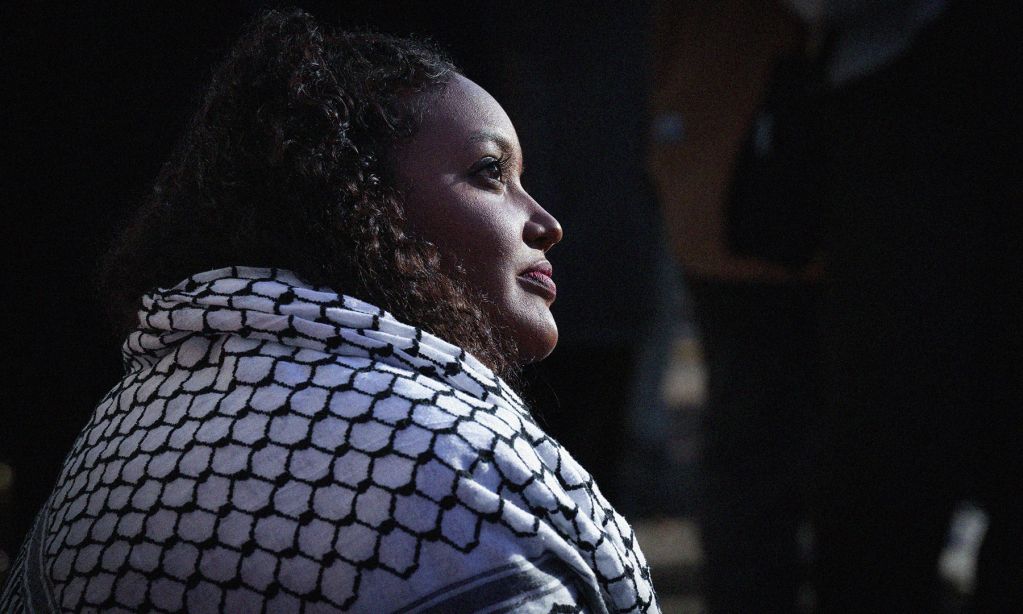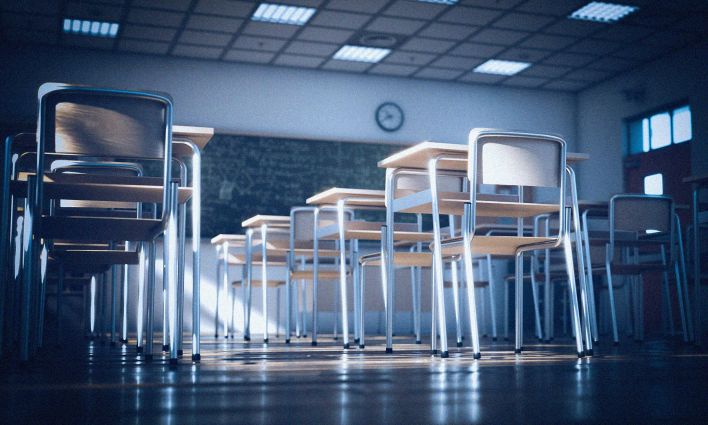On March 7, 2024, Ontario Speaker of the House Ted Arnott unilaterally banned the Palestinian keffiyeh in the legislative assembly as a “political statement,” a move that can be overturned by the unanimous consent of the entire assembly. Since then, politicians from across parties have spoken out against the ban, including Premier Doug Ford.
On April 25, newly independent MPP Sarah Jama wore a keffiyeh in the assembly and was ejected from the space. A photograph of the sergeant-at-arms looming over Jama, with three young, racialized pages looking on, circulated on social media. Journalist Shree Paradkar tweeted that the image “perfectly captures this moment in Ontario’s political, racial, sociological history. Who’s being ousted, for what reason, how alone she is, who is looking resolutely ahead or away and what.”—a sentiment shared by many online.
Much of the reaction revolved around hypocrisy, free expression, and liberal inclusion. Other heritage symbols, such as tartans, are allowable, and it goes against liberal sensibilities of individual freedom to police someone’s dress. The Ontario NDP has pledged to “defy the keffiyeh ban” if Premier Ford doesn’t intervene to overturn it.
The discourses against this ban, including the ONDP’s opposition, risk reducing what Jama herself has named as a struggle against Israeli apartheid to the individual right to clothing, akin to critiques of Bill 21 in Québec banning religious symbols for public servants. The ONDP already demonstrated their rejection of Jama’s material demand when they ejected her from caucus after she called for a ceasefire and named Israeli occupation as “apartheid” and “settler colonialism.”
The very architecture and aesthetics of the Legislative Assembly embody Canadian national mythologies and the nation-state’s British-imperialist heritage. The cries of hypocrisy overlook that allowable heritage garb or symbols, such as the tartan or even Israeli army dog tags, are neutral towards—or aligned with—the state. To wear the keffiyeh in this space, and to be expelled for it, is a microcosm of the limits of liberal inclusion within the settler-colonial state.
The boundaries of settler-colonialism have always required violence, both within and without— policing who belongs in the nation and who is marked for expulsion or death. A ban on the keffiyeh enables both quotidian and state violence against Palestinians and those who stand with them. Arnott’s decision to exclude the keffiyeh from the Assembly is in continuity with the broader harassment and expulsions of those who wear the keffiyeh across workplaces, schools, and public spaces—it decrees that political statements critical of Israel are threats to the body politic in Canada and those who espouse them are “outside” the nation. Indeed, liberal inclusion is always haunted by its exclusions.
Canada’s material and ideological ties to Israel are well-documented, from arms sales to academic exchanges. The Israeli colonization of Palestine has been integral to the post-war liberal-imperialist world order. US President Joe Biden has repeatedly claimed that “if there were not an Israel, we’d have to invent one.” In Canada, Stephen Harper pronounced “those who threaten Israel also threaten Canada,” a cross-partisan entanglement that continues under Justin Trudeau during the escalating genocide.
The Speaker was correct to name the keffiyeh as a political statement—one in opposition to the colonization of Palestine, that exceeds its status as clothing. It is not merely a heritage scarf worn by Palestinians, but by those all over the world who stand with Palestine against the complicity of our particular nation-states and global imperialisms generally.
Liberal mythologies of settler-colonialism immunize themselves against critiques through selective incorporation. In a historical example, Viola Desmond bravely took on individual risk to challenge racial segregation in a theatre and was arrested and jailed. Desmond’s demand for formal inclusion within the liberal settler-colonial nation-state was a critical struggle for Black people facing violent exclusion during her time. She subsequently became a Canadian civil rights icon and her likeness is now on the $10 bill.
Desmond’s spatial ejection may have superficial parallels to Jama’s, but its metabolization into money is fundamentally not possible with Jama’s material demand for an end to settler-colonial Canada’s entanglement with the settler colonization of Palestine.
Palestine is not a metaphor or symbol for liberation. Rather, the struggle for Palestinian liberation has laid bare the limits of settler mythologies of liberal inclusion in Canada and globally. The material struggle around land and life-making of Palestinians cannot be incorporated into liberal narratives. It demands a reckoning—not only of Canada’s external imperialisms but its own settler colonialism.
After her ejection, Sarah Jama told CP24, “wearing the keffiyeh is the least we can do with 40,000 continuing to be killed in the state of Palestine.” Jama took on individual risk by defying the keffiyeh ban, despite the intensified consequences for someone in her position as a Black Muslim woman wearing a hijab and using a motorized chair.
Her courageous act exceeded herself as one MPP in one Legislative Assembly. The wearing of the keffiyeh here makes visible the limits of liberalism—and the lie of the Canada-as-mosaic multicultural discourse that erases Canada’s own colonialism and imperialism.
Our historical moment is seeing a crisis in liberal hegemony, as politicians from across the so-called political spectrum are closing ranks in service of settler colonialism and imperialism and legitimizing greater violence. Clashes at the borders of inclusion and exclusion will only intensify, and we are seeing its manifestations in increased state violence from protests to picket lines to university campuses.
As a politician, Jama stands out as an exception who names the material relations of colonialism and imperialism—but she is not alone. People from all walks of life, all over Canada and the world, are organizing for Palestinian liberation and understand materially that our struggles are entwined.







